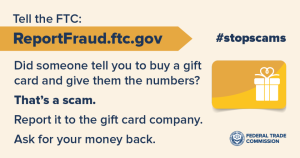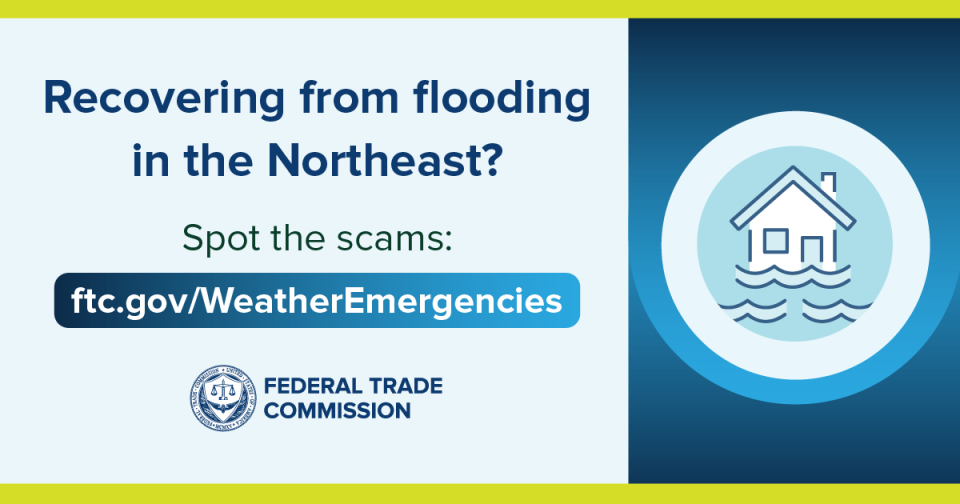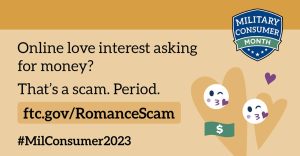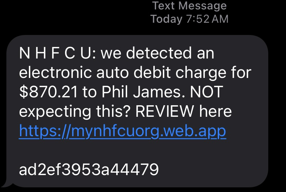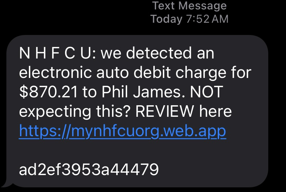Fraud and Security
Your financial well-being is important to us. Visit this page to find news, alerts, and other info to keep you informed about identity theft and fraud scams. Should you suspect, you may be a victim of fraud, please contact us at (603) 224-7731.
Comparing Credit, Charge, Secured Credit, Debit, or Prepaid Cards
Payment cards like credit, charge, secured credit, debit, and prepaid cards offer various ways to make purchases without cash, each with distinct features, fees, and legal protections. Choosing the right card depends on your financial situation and spending habits.
Credit Cards
Credit cards allow you to borrow money to make purchases, which you then repay, typically with interest. The card agreement outlines interest rates (APR), credit limits, and fees. Paying bills on time helps build a good credit history, which influences eligibility for jobs, housing, insurance, and future borrowing costs.
Common fees include annual fees, setup fees, monthly maintenance fees, and charges for cash advances, balance transfers, and exceeding your credit limit. Late payments incur late fees and can significantly increase your APR. You can avoid interest on purchases by paying your full balance by the due date. Shopping around for the best APR is crucial to minimize costs.
Credit cards offer strong legal protections. Your maximum liability for unauthorized use before reporting a lost or stolen card is $50. They also provide dispute rights for various issues, such as incorrect charges, duplicate billing, undelivered items, or wrong/damaged goods, allowing you to potentially get your money back.
Charge Cards
Issued by financial companies, charge cards do not charge interest and typically have no pre-set spending limit. However, the full balance must be paid off with each statement, usually monthly.
Fees often include a high annual fee and late payment fees if the balance isn’t paid on time. Charge cards provide the same liability and dispute protections as credit cards, limiting unauthorized use liability to $50 and allowing for error disputes.
Secured Credit Cards
Secured credit cards require a deposit with the issuer, usually a percentage (even up to 100%) of your credit limit. This deposit acts as collateral, ensuring the issuer is paid if you default. The deposit is typically returned when you close the account and pay off your balance.
These cards are beneficial for building or improving credit history, as many issuers report your payment activity to credit bureaus. Consistent, on-time payments, staying within your credit limit, and meeting other requirements can help you qualify for an unsecured card in the future.
Secured cards often have higher APRs and annual fees than unsecured cards, along with potential activation or monthly maintenance fees. Despite this, they offer the same legal protections as other credit cards, including the $50 liability limit for unauthorized use and dispute rights for errors.
Debit Cards
Debit cards are linked to your checking account, allowing you to spend money you already possess. They generally don’t involve borrowing money or paying interest and do not help build credit history, as they draw directly from your funds rather than extending credit.
While there are no annual fees for debit cards, you might incur other checking account-related fees, such as maintenance fees or overdraft fees if you spend more than available. Overdraft protection for purchases may be offered, allowing you to overspend for a fee and interest, but requires prior opt-in. Without it, transactions exceeding your balance will be declined without an overdraft fee, though automatic payments may still incur fees.
Debit cards offer limited legal protections compared to credit cards. Your liability for lost or stolen cards depends on how quickly you report the issue, and delayed reporting can mean losing all your money. Dispute rights are also more restricted, though you may recover funds for unauthorized use or incorrect charges.
Prepaid Cards
Prepaid cards are loaded with money beforehand and allow you to spend up to that loaded amount. Many are reloadable, meaning you can add more funds. They are widely available, don’t require a bank account or good credit, and don’t involve interest.
Most prepaid cards have network logos (e.g., MasterCard, Visa), allowing them to be used wherever that logo is accepted. Cards without a network logo have limited usage. Generally, prepaid cards do not help build credit history as they are not reported to credit bureaus. Gift cards are distinct from prepaid cards, typically non-reloadable, and lack the same legal protections.
Fees for prepaid cards can include activation fees, usage fees (monthly or per-use), money-adding fees, ATM withdrawal fees, and inactivity fees. Issuers must disclose these fees before purchase and on their websites. Some prepaid cards offer the ability to spend more than the loaded amount, essentially acting as a credit line and potentially incurring interest and credit-related fees.
To gain legal protections, including limited liability for unauthorized use, it’s crucial to register your prepaid card, typically by following instructions on the card’s packaging.
Based on an article by the FTC: Comparing Credit, Charge, Secured Credit, Debit, or Prepaid Cards | Consumer Advice
National Scam Targeting Local Residents
The “Publishers Clearing House” scam is a fraudulent scheme where scammers impersonate the legitimate sweepstakes company, claiming you’ve won a prize and that you need to pay taxes or fees to receive it. Never send money to claim a prize, sweepstakes winnings, or lottery winnings, as it’s a red flag of a scam.
Local residents are being targeted by a sophisticated check fraud scam.
Here’s how it works:
1. Fake Check Sent: Scammers send a fraudulent check to the victim, often with a convincing letter that includes the need to cover “taxes,” “fees,” or “processing charges” before receiving your full prize – which the check will cover…
2. Pressure to Deposit: The scammer instructs the victim to deposit the check into his/her bank account.
3. Urgent Wire Request: Before the fake check has a chance to officially clear (which can take several business days), the scammer calls the victim. They create a sense of urgency and instruct the winner/victim to wire funds for those pesky taxes immediately.
4. Victim Wires His/Her Own Money: Believing the fake check’s funds are available or soon will be, the victim wires money from his/her own personal funds to the scammer. For example, if a scammer sends a $1,000 check to taxes and fees, they might ask the victim to wire back the amount. If the person cannot send all of it back because of balance limitations – they will accept whatever “can” be sent. After all – the big prize is coming right after the victim/winner gets the complete prize (which is never coming!).
5. Check Bounces, Victim Loses Money: Days later, the original fake check bounces (identified as fraudulent) and the funds are removed from the victim’s account. However, the money the victim wired to the scammer is gone and cannot be returned. The victim is personally out the money (e.g., $2,300) with no way to recover it. Note: gift cards may also be requested as payment…
Key points about the scam:
- Fake Letters/Emails: Scammers send letters or emails claiming you’ve won a Publishers Clearing House or other “known” company prize.
- Request for Payment: They ask you to send money upfront for “taxes,” “fees,” or “processing charges” before you receive your “full” prize.
- Fake Checks: Some scams include fake checks that are certain to be returned unpaid, leaving you responsible for the funds.
- High-Pressure Tactics: Scammers often use urgency or pressure tactics to encourage you to act quickly.
- Unsolicited Contact: PCH only contacts individuals who have entered their sweepstakes.
- Strange Payment Methods: Scammers often request payment through methods like gift cards, wire transfers, or cashier’s checks, which are difficult to trace and recover.
Real vs. Fake:
- Legitimate PCH winners are not asked to pay upfront.
- PCH uses its own channels for contacting winners.
- Taxes on lottery winnings are handled by the IRS and are not paid upfront.
What to do if you receive a suspicious communication:
- Don’t Respond: Ignore the letter, email, or phone call.
- Don’t Send Money: Never send money or give out personal information.
- Report It: Report the scam to the Federal Trade Commission (Federal Trade Commission website) or your local police department.
The two big rules to follow:
1. If it sounds too good to be true, it probably is.
2. If you’re really not sure, come see us. We see these things regularly and know how to spot a scam!
Pass It On (Let’s Talk Scams)
Last year in New Hampshire, 8,872 residents filed fraud reports. Not all of those reports resulted in a loss. However, the losses reported in New Hampshire total a staggering $14,650,766.
This video from the Federal Trade Commission shows how easy it is to start a conversation about scams and how to protect yourself from them. Learn more about passing on information that could help someone you know at ftc.gov/passiton.
NH Data: https://public.tableau.com/app/profile/federal.trade.commission/viz/FraudReports/StateSubcategories (choose your state and year)
Americans Share Best Financial Advice They Ever Received —It’s Eye-Opening
Summary of article from Newsweek by Soo Kim
Separating needs from wants and saving money as early as possible are among the top money tips that Americans have received, a new poll has shown.
The poll conducted for Newsweek by Talker Research between April 11 and 17 asked 1,000 Americans to share the most-impactful financial advice they have ever been given. Here are the results:
- Start Saving Early: Emphasizes the power of compounding over time for retirement and financial well-being. Even small amounts saved early can significantly grow.
- Save Regularly: Highlights the importance of consistent saving habits, whether a fixed amount per paycheck or a percentage of income, tailored to individual goals.
- Stay Out of Debt: Advises avoiding debt, except possibly for a mortgage, as it hinders saving and the benefits of compounding. Living below one’s means and paying with cash is recommended.
- Know Your Needs Vs. Wants: Stresses the importance of distinguishing between essential expenses and discretionary spending to make informed financial decisions. A “day per dollar” rule can help with impulse purchases.
- Have More Than One Source of Income: Suggests diversifying income streams for greater financial security. Living off one income and saving/investing the other is one strategy.
- Have Your Own Bank Account When Married: Recommends maintaining individual bank accounts within a marriage for financial independence and as a safeguard during difficult times.
- Focus on What You Can Control: Advises concentrating on actionable steps like cutting expenses, increasing emergency funds, and avoiding panic during financial challenges. Small, consistent efforts are key.
- Remember That Money Goes Quickly: A sobering reminder that regardless of income, money tends to be spent, emphasizing the need for mindful spending and financial awareness.
Americans Share Best Financial Advice They Ever Received—It’s Eye-Opening – Newsweek
Protect yourself (and your money)
from scammers this Financial Literacy Month
By: BCP Staff at consumer.ftc.gov
All year long, scammers are looking for ways to steal your hard-earned money. FTC data shows people reported losing $12.5 billion to scams in 2024, which is up $2.5 billion from 2023. April is Financial Literacy Month: a great time to check out the free resources at consumer.gov to help manage your money while protecting it from scammers.
Looking to make a budget that helps you save money, buy a car, rent an apartment or house, or deal with debt? Consumer.gov has the info you need to spot, avoid, and report scams as you make your plans.
At consumer.gov, you’ll get the basics on managing your money and advice on:
• How to protect your money and information from scammers
• What to do if you think you sent money to a scammer or gave a scammer your personal information
• How to protect yourself from identity theft
You’ll also find videos and free, one-page handouts to share with family, friends, and other groups you might be a part of — like your neighborhood association, church group, or club meeting.
And if you spot a scam, tell the FTC at ReportFraud.ftc.gov.
Top scams of 2024
Article by BCP at FTC.gov
Did you or someone you know report a scam to the FTC in 2024? Thank you! Those reports help the FTC bring enforcement cases and educate people about scams. Let’s jump into the top 2024 scams.
The headline is this: even though the number of fraud reports is roughly the same as last year, more people lost a lot more money to fraud. One in three people who reported fraud said they lost money (up from one in four last year), adding up to $12.5 billion (up $2.5 billion from 2023). People lost over $3 billion to scams that started online, compared to approximately $1.9 billion lost to more “traditional” contact methods like calls, texts, or emails. However, people lost more money per person (a median of $1,500) when they interacted with scammers on the phone. And, once again, imposter scams topped the list of scams reported.
Here are some other things to know:
The biggest scam losses happened by bank transfer or payment. Among all payment methods, people reported losing more money through a bank transfer or payment ($2 billion), followed by cryptocurrency at $1.4 billion.
Investment scams led to big losses. A majority (79%) of people who reported an investment-related scam lost money, with a median loss of over $9,000. The $5.7 billion losses in this category are up about $1 billion from last year.
People reported losing money more often when contacted through social media. Most people (70%) reported a loss when contacted on a social media platform — and lost more money overall ($1.9 billion).
Job scams and fake employment agency losses jumped — a lot. Between 2020-2024, reports nearly tripled and losses grew from $90 million to $501 million.
Younger people lost money more often. People aged 20-29 reported losing money more often than people 70+. But when older adults’ lost money, they lost far more than any other age group.
The biggest takeaway? Your reports make a difference. If you see a fraud or scam, the FTC wants to hear about it: go to ReportFraud.ftc.gov.
Check out the graphic for the top scams of 2024 below. Read the 2024 Data Book for more details and to learn what happened in your state.
Protecting Your VA Benefits and Avoiding Scams
Event Description
The Federal Trade Commission (FTC) and the U.S. Department of Veterans Affairs’ Veterans Benefits Administration are partnering during National Consumer Protection Week to present a free webinar. Join the discussion to learn about ways to protect your veterans pension and disability benefits from scammers and what to know if you’re a veteran (or family member) applying for VA benefits.
To join the webinar on March 5th, 2025, at 2:00 pm ET:
URL: https://ftc.zoomgov.com/j/1605654091?pwd=KWMlMqmiRUs8w4vjeQEKagRhzWq1Ck.1
Webinar ID: 160 565 4091
Passcode: 887316
For more details visit: https://www.ftc.gov/news-events/events/2025/03/protecting-your-va-benefits-avoiding-scams-english
Mobile Payment Apps: How To Avoid a Scam When You Use One
01/24/2024
Based on an article by the FTC
Mobile payment apps like Venmo, Cash App, and PayPal offer a convenient way to send and receive money via smartphones. After setting up an account and linking a payment method, users can transfer funds, which are stored in the app until transferred to a bank account.
However, scammers may try to exploit these apps by pretending to be someone in need or claiming you’ve won a prize, urging you to send money. To avoid falling for scams, avoid sending money to claim prizes, never share your account details, protect your account with multi-factor authentication, and verify unexpected money requests with the sender.
What To Do if You Sent Money to a Scammer
If you find unauthorized payments or think you paid a scammer, here’s how to report it to the mobile payment app.
Cash App. Cash App recommends chatting through their app for the fastest service. To do so, open the app, go to your profile, and choose Support. You can also get help through cash.app/help or by calling 1 (800) 969-1940.
Venmo. Venmo recommends chatting through their app for the fastest service. To do so, open the app, go to your profile, and choose Get Help. You can also email Venmo through their contact form or call them at 1 (855) 812-4430.
PayPal. Report it online through PayPal’s Resolution Center or call PayPal at 1 (888) 221-1161.
Report It to the FTC
If you paid a scammer with a mobile payment app, report it to the Federal Trade Commission at ReportFraud.ftc.gov. When you report a scam, you help the FTC and other law enforcement agencies stop scams.
Email or social media hacked? Here’s what to do
01/06/2024
By Alvaro Puig, Consumer Education Specialist, FTC.gov
Hackers target your email and social media accounts to steal your personal information. Like your username and password, bank or credit card account numbers, or Social Security number. If they get it, they use it to commit identity theft, spread malware, or scam other people. So, what are signs that someone hacked your account, and how can you recover a stolen account?
Here are some things that might tip you off to a problem:
You get a notification that your email address or phone number changed. Or that your password was reset. But you didn’t make those changes.
You get a message that someone tried to log in, or did log in, and it wasn’t you.
You can’t log in to your account.
If you can’t log in to your account, the FTC offers links to recover your account via this article https://consumer.ftc.gov/consumer-alerts/2024/10/email-or-social-media-hacked-heres-what-do
If you get a notification about activity you don’t recognize, and you can log in, here’s what to do:
Change your account password. Create a unique and strong password that is hard to guess. Aim for 12 to 15 characters. Or use a passphrase — a series of words separated by spaces. Then sign out of that account on all devices. That way anyone who’s logged in to your account on another device will get kicked out.
Secure your account. If the account offers two-factor authentication (2FA), turn it on to add an extra layer of security. That way, a hacker with your password can’t log in to your account without a second authentication factor. Like a verification code you get by text or email, or from an authenticator app.
Update your account recovery information. Account recovery information helps you get back into your account if you’re locked out, forgot your password, or if someone else is using it. Check your account recovery information and make sure the email address and phone number listed are correct.
Check for signs that someone had access to your account. Check if there are auto-forwarding rules in your email account that you didn’t set up. Hackers might create these rules to forward your emails to another address. Check your social media for messages the hacker posted or sent, or for new friends you don’t recognize.
If you believe someone stole your personal information, go to IdentityTheft.gov to report it and get a personalized recovery plan.
Scammers are delivering phishing messages this holiday season
12/10/2024
Article by Ari Lazarus, Consumer Education Specialist, FTC.gov
During the holiday season, you might expect to get more deliveries. Some might even be surprise gifts. Scammers are counting on that when they send fake delivery notifications to you by email and text, hoping you’ll click. Here’s how to spot these scams.
You get an email or text and it says you missed the delivery. Or it might say your item can’t be delivered because you need to update your street address or zip code. Sometimes these scammers create a sense of urgency by saying if you don’t respond right away, they’ll return your package to the sender. The scammers say both of these issues can easily be fixed: just click on a link.
Why do they want you to click that link? It’s a phishing scam. If you click, scammers could get information like your usernames and passwords for your online banking, email, or social media accounts. Scammers could then use those to steal your identity and open new accounts in your name. They might also install malware on your computer.
To avoid fake shipping notification scams:
Don’t click on links in messages about an unexpected delivery. If you get a message about an unexpected package delivery that tells you to click on a link for some reason, don’t click.
Contact the shipping company directly to get more information. If you think the message might be legitimate, contact the shipping company using a phone number or website you know is real. Don’t use the information in the message.
Check your order status. If you think the message could be about something you recently ordered, go to the site where you bought the item and look up the shipping and delivery status there.
No matter the time of year, it always pays to protect your personal information. Check out these resources to help you weed out spam text messages, phishing emails, and unwanted calls. ftc.gov/onlinesecurity
Protecting Your Child’s Identity & Credit Score
Between the day your child is issued their social security number and the day they turn 18 years old, it is your job as a parent to protect them from identity theft.
What Is Child Identity Theft?
Child identity theft happens when someone takes a child’s sensitive personal information and uses it to get services or benefits or to commit fraud. They might use your child’s Social Security number, name and address, or date of birth. They could use the stolen information to:
- apply for government benefits, like health care coverage or nutrition assistance
- open a bank or credit card account
- apply for a loan
- sign up for a utility service, like water or electricity
- rent a place to live
Take Action
In addition to protecting your child’s social security number, consider “freezing” your child’s credit.
If your child is under 16, you can request a free credit freeze, also known as a security freeze, to make it harder for someone to open new accounts in your child’s name. The freeze stays in place until you tell the credit bureaus to remove it. (Minors who are 16 or 17 can request and remove a security freeze themselves.)
To activate a credit freeze, contact each of the three credit bureaus. Find their contact information at IdentityTheft.gov.
For additional information on how to protect your child from identity theft visit: How To Protect Your Child From Identity Theft | Consumer Advice
In Honor of Veterans Day, share how you spot and avoid scams
By Samuel Levine, Director, Bureau of Consumer Protection, FTC.gov
Every November, people put out social media posts to honor family and friends who’ve served in the military. But did you know that service members and veterans reported losing more than $350 million to fraud last year?
Chances are, fraud has happened to someone you know. This year, make sure your Veterans Day tribute includes ways to help veterans, service members, and military families spot scammers.
When you talk about scams you’re seeing, you help veterans spot and avoid them too. So, tell your neighbor if you’ve heard about scammers who call claiming to help veterans file for benefits — but they’re really trying to steal their personal information or military benefits. Let grandpa know about a scam call you got that sounded real and said there’s something supposedly wrong, like unauthorized charges, with your bank account. You knew it was a scam because the caller told you to withdraw cash and deposit it into a specific Bitcoin ATM to protect it (big red flag!), so help your family members spot that scam. Offer to help your newly enlisted cousin sign up for free active-duty credit monitoring to restrict access to their credit report and protect against identity theft.
Once the conversation gets going, let them know you’re there to help. Share advice and resources to help them spot scams — and to know what to do if they were scammed. Here are three resources to get you started:
- MilitaryConsumer.gov/blog gives you the latest on scams. Subscribe to get updates sent straight to your inbox.
- VSAFE.gov combines federal resources to help veterans learn about many different fraud types and how to handle them — from car-buying to housing to military and veteran benefits.
- The National Veterans Financial Resource Center (FINVET) knows that financial well-being is linked to better mental health. Check out their tools to protect your money.
If you or someone you care about spots a scam, tell the FTC at ReportFraud.ftc.gov.
Avoid Scammers During Marketplace Open Enrollment
By Kira Krown, Consumer Education Specialist, FTC.gov
Looking to get or switch your Marketplace health insurance during open enrollment (November 1, 2024 – January 15, 2025)? Don’t click on ads that say they offer free things like phones or cash cards for gas, groceries, or bills to those who enroll in a health insurance plan. They’re probably scams.
The same goes for ads showing a famous person supposedly endorsing an insurance plan or services: That “person” might be a computer-made fake.
Instead, use the official Health Insurance Marketplace to find plans you qualify for, get help signing up, or enroll in the plan you choose directly.
To stay clear of scammy ads and get real help during open enrollment:
- Go to HealthCare.gov or call the Marketplace Call Center (1-800-318-2596) to compare and sign up for Marketplace plans.
- Find Local Help through Marketplace’s online directory. You can set up a time to talk in person, over the phone, or by email with Navigators who give free, unbiased help. You can also find and speak with licensed and registered agents and brokers.
And when you’re looking for health insurance, protect your money and information:
- Don’t pay anyone who claims they’re from the Marketplace or government and demands cash, cryptocurrency, or your credit or debit card numbers so you can get or keep health coverage.
- Don’t reply if someone you don’t know contacts you about health insurance and asks for your Social Security number or other personal, financial, or health information.
Report scammy healthcare ads by calling the Marketplace Call Center at 1-800-318-2596. Then tell the FTC: ReportFraud.ftc.gov.
Stay Alert for “Wrong Number” Text Scams
October 25, 2024
Have you received a text from an unfamiliar number claiming to know you? These messages often reference urgent meetings or casual hangouts. A simple “Sorry, wrong number,” which confirms they have reached a valid number, can be exactly what scammers are looking for.
Once they have your attention, scammers might try to engage you in friendly conversation, sometimes for weeks or even months, before attempting to pull you into any number of scams.
Best Ways to Protect Yourself:
- Ignore messages from unknown numbers: Responding confirms your number is active, which can lead to more scams.
- Block suspicious numbers right away: This helps prevent further contact from scammers.
- Never clicking on links from unknown numbers: Links may lead to malicious websites that can infect your device with malware.
- Keep personal information private: Never share personal or banking details.
If you’re an NHFCU member and suspect your personal or financial information has been compromised, please contact us right away.
Safely Donating to Hurricane Recovery Efforts
October 15, 2024
Recovering from the devastating flooding and destruction of a hurricane takes time and money. To make sure your hard earned money is donated to people in need and not scammers, review the information below.
Donating Safely and Avoiding Scams
When you decide to support a cause you care about, you want your donation to count. Doing some research and planning your giving can help ensure your donations get where they’ll do good. Here are tips to help you plan your donation– and avoid scams.
Do some research online
- Looking for a charity to support? Search for a cause you care about – like “hurricane relief” or “homeless kids” – and phrases like “best charity” or “highly rated charity.”
- When you consider giving to a specific charity, search its name plus “complaint,” “review,” “rating,” or “scam.”
- Use these organizations to help you research charities.
- Donating by cryptocurrency? Watch for scammers who want to take your donation. Learn more at ftc.gov/cryptocurrency.
Be careful how you pay
- If someone wants donations in cash, by gift card, or by wiring money, don’t do it. That’s how scammers ask you to pay.
- To be safer, pay by credit card or check.
- It’s a good practice to keep a record of all donations. And review your statements closely to make sure you’re only charged the amount you agreed to donate – and that you’re not signed up to make a recurring donation.
- Before clicking on a link to donate online, make sure you know who is receiving your donation. Read Donating Through Crowdfunding, Social Media, and Fundraising Platforms for more information.
Keep scammers’ tricks in mind
- Don’t let anyone rush you into making a donation. That’s something scammers do.
- Some scammers try to trick you into paying them by thanking you for a donation that you never made.
- Scammers can change caller ID to make a call look like it’s from a local area code.
- Some scammers use names that sound a lot like the names of real charities. This is one reason it pays to do some research before giving.
- Scammers make lots of vague and sentimental claims but give no specifics about how your donation will be used.
- Bogus organizations may claim that your donation is tax-deductible when it is not.
- Guaranteeing sweepstakes winnings in exchange for a donation is not only a scam, it’s illegal.
If you see any red flags, or if you’re not sure about how a charity will use your donation, consider giving to a different charity. There are many worthy organizations who will use your donation wisely. Report scams to ReportFraud.ftc.gov. Find your state charity regulator at nasconet.org and report to them, too. Share any information you have – like the name of the organization or fundraiser, phone number, and what the fundraiser said.
Organizations that can help you research charities
These organizations offer reports and ratings about how charitable organizations spend donations and how they conduct business:
- BBB Wise Giving Alliance
- Charity Navigator
- CharityWatch
- Candid
The IRS’s Tax Exempt Organization Search tells you if your donation would be tax deductible.
You can find your state charity regulator at nasconet.org. Most states require the charity or its fundraiser to register to ask for donations.
SOURCE: https://consumer.ftc.gov/features/donating-safely-and-avoiding-scams
PREVENT Account FRAUD and Identity THEFT
October 10, 2024
PROTECT YOUR PERSONAL INFORMATION
Protecting your personal and account information is our top priority. At NHFCU, your information is safe and secure. With account fraud and identity theft on the rise, it is important for you to help protect yourself. Here are a few tips:
Education
Skilled identity thieves use a variety of methods to gain access to your personal information. The best way to protect your identity is to educate yourself and be aware of common scams. Visit nhfcu.org/FraudSecurity on our website for information on current scams, and links to additional resources.
Credit Report
Combat fraudulent activity by monitoring your credit report. If accounts are opened in your name, they will appear on your credit report. Consumers can obtain a free credit report annually from all three credit bureaus at www.annualcreditreport.com. This is the only official free credit report website.
Online and Mobile Banking
Prior to entering your account information, verify that you are using our website: ww.nhfcu.org and not a spoofed site (fake email or website address that looks legitimate). Always be sure to log out of online or mobile banking before closing the window or app. Never store your personal or account information in plain text on your computer or mobile device. Consider using a secure wallet to securely store your account information and passwords.
Personal Information
NHFCU will never contact you by phone, email or text asking you to provide account numbers, passwords, social security numbers or other personal information. Do not respond and notify us immediately if you receive such a request. And if you receive an email or text asking you to log into your account, do not click on any links or respond. Instead, call us directly. This is true for most companies that you do business with. Thieves can impersonate real companies through email, text and phone in order to steal your information. Call the company directly to verify the legitimacy of the request.
Suspicious Activity
If you think you have been the victim of fraud, if you doubt the authenticity of a solicitation, notice or email regarding your NHFCU account or you suspect your account has been compromised, contact us at (603) 224-7731, or 1 (800) 639-4039.
Hang Up on Unwanted Calls About Loans
September 24, 2024
Based on an Article by Bridget Small, Consumer Education Specialist
People are reporting getting multiple calls, sometimes from different numbers, about their supposed “loan application.” They haven’t applied for a loan. What should you do if this happens to you?
- Don’t press a number to “unsubscribe.” That only lets the dishonest company know your number is good. Instead, just hang up.
- Use call blocking to stop calls before they reach you. Learn how at How to Block Unwanted Calls. For your mobile phone, find a list of call-blocking apps at ctia.org.
- Don’t give information to businesses you don’t know, even if they seem to know you. That could be a set up to get your personal information.
- Register your cell and home phone for free at the National Do Not Call Registry. Registration never expires and is designed to stop unwanted sales calls from companies that follow the law. Being on the registry doesn’t block calls and won’t stop calls from scammers — However, eliminating legitimate sales calls makes it easier to spot the scammers.
If you’ve gotten calls like these, report unwanted calls at DoNotCall.gov.
Hang Up on Unwanted Calls About Loans
September 24, 2024
Based on an Article by Bridget Small, Consumer Education Specialist
People are reporting getting multiple calls, sometimes from different numbers, about their supposed “loan application.” They haven’t applied for a loan. What should you do if this happens to you?
- Don’t press a number to “unsubscribe.” That only lets the dishonest company know your number is good. Instead, just hang up.
- Use call blocking to stop calls before they reach you. Learn how at How to Block Unwanted Calls. For your mobile phone, find a list of call-blocking apps at ctia.org.
- Don’t give information to businesses you don’t know, even if they seem to know you. That could be a set up to get your personal information.
- Register your cell and home phone for free at the National Do Not Call Registry. Registration never expires and is designed to stop unwanted sales calls from companies that follow the law. Being on the registry doesn’t block calls and won’t stop calls from scammers — However, eliminating legitimate sales calls makes it easier to spot the scammers.
If you’ve gotten calls like these, report unwanted calls at DoNotCall.gov.
IMPORTANT Fraud Spoofing Reminder
August 22, 2024
An important reminder: Be cautious about calls seemingly coming from NHFCU requesting your full account or debit card numbers, etc.
Fraudsters are known to “spoof” information to appear legit on caller IDs. NHFCU reps and our fraud monitoring services will not ask you for complete account numbers, PINs, etc. If you question the validity of a fraud monitoring call or text message, please contact us directly.
Please share this information with family and friends.
How to avoid getting burned by solar or clean energy scams
August 15, 2024
Article written by Larissa Bungo, Senior Attorney, FTC.gov
When temperatures rise, utility costs do, too. While reputable companies can help you save money with clean or solar energy improvements, scammers offer more than they can deliver. The scams vary, but here’s the gist: someone claiming to be with the government or your utility company promises big savings on your utility bills from solar energy or other home improvements designed to increase energy efficiency. If you agree to the scammer’s offer, it could cost you tens of thousands of dollars.
These scams start with an unexpected phone call, message on social, or even an in-person visit. The so-called official offers you an “energy audit” to reduce your utility costs. Or they might try to sign you up for a “free” program to make your home more energy efficient with solar energy. While they might say they’re from your utility company or the government, they’re not. And while they promise free or low-cost solar panels, or offer you huge rebates, tax credits, or utility incentives to pay for those solar panels, those are lies. Some so-called officials even say your utility company already signed you up for the program, so now you need to pay. That is, of course, also a scam.
To protect yourself from clean energy scams:
- Know that “free” or “no cost” solar panel offers are scams. The federal government does not install solar systems in homes for free. If you’re considering whether solar energy is right for you, check out the Department of Energy’s guide for homeowners and learn more. Or check out the Department of Treasury’s guidance on clean energy.
- Take your time. Anyone who pressures you into a contract or demands up-front or immediate payment is a scammer. Legitimate businesses and government agencies don’t pressure you to act immediately and won’t tell you to pay with cash, gift card, wire transfer, payment app, or cryptocurrency. But imposters will. Learn more at ftc.gov/imposters.
- Protect your personal information. Don’t respond to unexpected requests online or on social media for your name, address, or other personal information to “see if you qualify.” At best, this is someone generating leads to sell, not actual solar businesses. At worst, they’re scammers trying to steal your identity.
If you spot a scam, tell the Federal Trade Commission at ReportFraud.ftc.gov.
Scammers Impersonate Airline Customer Service Representatives
August 7, 2024
Article written by Alvaro Puig, Consumer Education Specialist, FTC.gov
Most people can probably agree that there are few things more frustrating than airline delays or cancellations that leave you stranded at the airport. Whether the issues are the result of an unprecedented event like the Crowdstrike glitch that grounded thousands of flights worldwide, or more common disturbances like weather delays, desperate travelers often turn to social media for help from the airlines.
Scammers crawl social media looking for posts from upset travelers. They reach out to them through fake social media accounts and pretend to be an airline customer service representative who’s there to help. The scammers ask passengers for a slew of information, like their booking confirmation number, phone number, or bank account. Or they send passengers to a spoofed site that harvests their personal information and use it to steal the passenger’s identity or rack up charges on their accounts.
If you’re dealing with travel troubles, here’s how to avoid getting re-routed to an airline impersonator:
- Log in to your airline account and contact customer service through the airline’s official app, website, chat, or phone number.
- If you’re at the airport, speak to a customer service representative in person.
- If you reach out through social media, find the airline’s official social media page on their website. Look for a verification symbol or badge. And never give out personal information on social media.
If someone stole your personal information, go to IdentityTheft.gov to report it and get recovery steps. And report imposters to the FTC at ReportFraud.ftc.gov.
Visit FlightRights.gov to learn about the airline passenger protections you are entitled to, or to file a complaint with DOT if an airline is not treating you fairly.
Scammers target young adults on social media with fake check scam
July 24, 2024
Based on an article written by Larissa Bungo, Senior Attorney, FTC.gov
Young adults have reported encountering a fraudulent scheme that commences with a direct message on social media from an individual who expresses admiration for your photo and offers to compensate you with a substantial sum in exchange for its usage. Following this, they will dispatch a check to you. Subsequently, they will instruct you to deposit the check, withdraw a portion of the funds to send to the artist for procurement of supplies, and retain the remaining amount. There may be assurances of reimbursing any funds sent back; however, this never materializes as it is a deceitful scheme.
Despite the check appearing authentic and the funds reflecting in your bank account initially, the check is counterfeit. Once the bank detects this, you will have lost the money sent to the scammer and be liable for any withdrawn funds.
How can you identify this scam? The key takeaway is this: if an unfamiliar individual sends you a check and requests you to remit funds back to them or to a third party, it is a scam. It is advisable to exclusively deposit checks received from acquaintances whom you know and trust.
Learn more about how to spot fake check scams.
If you spot a scam, report it at ReportFraud.ftc.gov.
And if you think you’ve paid a scammer, here’s what to do.
Scammers target young adults on social media with fake check scam | Consumer Advice (ftc.gov)
Got a call about fraud activity on your bank account? It could be a scammer
July 11, 2024
Based on an article by Terri Miller, Consumer Education Specialist, FTC
Beware of scammers contacting you via phone, email or text with a warning involving fraudulent activity on your financial accounts. It’s a scam. Here are 7 things to keep in mind if you think you are dealing with a scammer:
- Stop and take the time to verify the legitimacy of any communication by contacting your official bank, broker, or investment advisor using the contact information on your statements.
- Do not transfer funds with anyone claiming to protect your money – unless YOU initiate the transaction by contacting your financial institution using their PUBLISHED NUMBERS.
- Do not share verification codes with anyone claiming to protect your money.
- Contact your financial institution to report any suspicious incidents.
- Your funds are secure where they are, regardless of persuasive tactics used by fraudsters. Never move money to “protect it” – unless you know your information has been compromised!
- Exercise caution when receiving unsolicited calls, texts, or messages asking for personal financial information or money transfers. Never share verification codes.
- Bank accounts offer fewer protections than credit cards, so be cautious about transferring funds out of your account.
- Promptly inform your financial institution and report suspicious communications to the Federal Trade Commission.
Share this advice to help protect others from falling victim to scams.
Military Consumer Month 2024
July 3, 2024
Based on an article by Samuel Levine, Director, Bureau of Consumer Protection, FTC
July is Military Consumer Month, so we’re deploying advice you can use. Imposter scams can target individuals at any point in their military journey, whether they are new recruits or seasoned veterans. These scams involve perpetrators posing as trusted entities such as financial institutions, government agencies, family members in trouble, reputable companies, or IT professionals. To safeguard yourself and your loved ones from falling victim to such deceitful schemes, it is crucial to stay informed and alert. By seeking guidance and resources from the Federal Trade Commission (FTC), you can equip yourself with the knowledge and tools necessary to recognize and combat these fraudulent activities effectively.
Scammers are constantly evolving their tactics to deceive individuals into giving away their money or sensitive personal information. To protect yourself, it is crucial to stay informed about the latest scamming techniques. Always remain vigilant and remember the BLUF (bottom line up front) advice: If your bank or credit union unexpectedly contacts you regarding suspicious account activity, verify the legitimacy of the call as it could be a scam. Be cautious of job recruiters on online platforms offering high-paying work-from-home opportunities; research the job offer thoroughly before proceeding, as it could be a fraudulent posting. Similarly, exercise caution when encountering attractive rental deals on social media; ensure the legitimacy of the listing before making any payments, as scammers often create fake rental postings for properties that are not available. By staying informed and conducting due diligence, you can stay one step ahead of scammers and safeguard your finances and personal information. Learn more at ftc.gov/imposters.
To keep up with what’s happening related to scams, sign up for email updates at MilitaryConsumer.gov.
Job Scams That Start on Social Media
June 28, 2024
By Colleen Tressler, Division of Consumer and Business Education, FTC
Here’s a new scam spotted on social media: appointment setting jobs. They claim you can work from home and make big money. But just what does an appointment setter do? And how can you tell the difference between a legit job offer and a scam?
An appointment setter is someone who schedules calls for a company’s sales staff and potential clients to help them close deals. You’re typically paid an hourly rate, but might earn bonuses based on the number of appointments you successfully set. If you need training, the employer should offer it at no cost to you.
Now that you know the basics, here are some ways to tell the difference between an appointment setter job scam and a legitimate position. Scammy ads tend to promise a very high income. The truth is that real appointment setting is a normal job with a modest income. Scammy job offers claim you have to pay thousands of dollars upfront for training. The truth is honest employers will never ask you to pay to get a job. Scammers say they’ll guarantee you a job once you pay for training. The truth is no one can guarantee you a job. Scammers may also look more like a business opportunity than a paid position, promising you potential clients, or suggesting you recruit new people to their “job” training programs, instead of setting appointments.
Before you accept a job or business opportunity offer:
- Take your time and talk to someone you trust. Scammers will try to pressure you to get involved or risk losing out.
- Do some research. Search online for the name of the company and words like “review,” “scam,” or “complaint.” Check with your state attorney general for complaints. No complaints? It doesn’t guarantee that a company is honest, but complaints can tip you off to possible problems.
- Read success stories and testimonials with skepticism. They might not be true or typical. Glowing stories of success could be fake or misleading, and positive online reviews may have come from made-up profiles.
If you see a job or business opportunity scam, or lose money to one, report it to the FTC at ReportFraud.ftc.gov.
No one is using your Social Security number to commit crimes. It’s a scam.
May 14, 2024
If you ever receive a call from someone claiming to be from the Social Security Administration, it’s essential to be cautious. One common scam involves a caller who claims that your name and Social Security number are linked to serious crimes or there is an arrest warrant out for you and that the courts want to seize your bank and retirement accounts. Do not provide any personal information or agree to purchase anything, such as gold, as this is a tactic used by scammers to steal your money.
If you receive such a call, it’s best to hang up immediately and report the incident to the Federal Trade Commission. It’s crucial to remember that the Social Security Administration would never call you to threaten or intimidate you. The Social Security Administration will always communicate with you through the mail, and they will never ask you to disclose your Social Security number over the phone. Be vigilant and protect yourself from these types of scams.
It can be a scary experience when someone calls you out of the blue and demands that you go to the bank immediately. It’s natural to feel nervous and overwhelmed in such a situation. However, it’s important to keep your wits about you and not let the caller push you into making a hasty decision. If you’re unsure about the legitimacy of the call, take a moment to do some research before following their instructions. Anyone who asks you to withdraw cash or buy gold is likely trying to scam you. Don’t hesitate to report them to the FTC at ReportFraud.ftc.gov. Stay vigilant and protect yourself from these types of scams.
If you ever receive a call from someone claiming that someone is coming to your house to pick up valuable items, such as cash or gold, it’s crucial that you call the police immediately. This type of elaborate impersonation scheme is designed to rip you off and can lead to serious consequences. To learn more about this and other common imposter scams, be sure to check out How to Avoid Imposter Scams | Consumer Advice (ftc.gov). By staying informed and aware, you can help protect yourself from falling victim to these types of fraudulent schemes.
Protect Your Accounts
April 30, 2024
- Safeguard your cards, PINs, receipts, and deposit slips. It is essential to handle these items with care and shred all paperwork with personal information. Thieves still go though trash.
- When you go out shopping, carry only the cards you’ll need, leave the rest safe at home.
- Avoid carrying your pin with you. Never write your PIN on the card itself, or in a place someone could see.
- Make sure your PIN isn’t something that someone could easily guess like a birthday or easy to figure out by watching you type it in such as 1234 or 5555.
- Always make sure to cover the keypad with your other hand while typing in your PIN.
- If you think your PIN has been compromised you can change your PIN on our mobile App under “Cards” or call 1-800-992-3808 (for future reference, store this number in your phone).
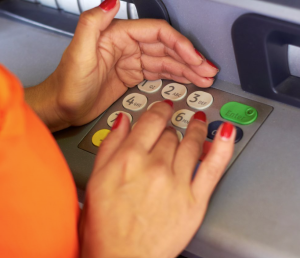
Protect Yourself from Phishing Scams
March 28, 2024
In today’s digital age, it is crucial to be aware of the threat of phishing. Phishing occurs when malicious individuals use deceptive links via emails or texts or call to trick you into revealing sensitive personal information such as account details or passwords. These scammers can then exploit this information to commit identity theft or financial fraud. By clicking on malicious links, you could inadvertently expose your computer to ransomware and other harmful programs, compromising your data security. Stay vigilant and safeguard your personal information by being cautious of unsolicited communications and verifying the authenticity of requests before sharing any sensitive data.
Stay informed and vigilant against phishing scams by recognizing common tactics used in deceptive emails and text messages. Scammers often impersonate trusted companies or institutions to lure unsuspecting individuals into clicking on malicious links or opening harmful attachments. By being cautious of unexpected messages and verifying the sender’s legitimacy, you can protect yourself from falling victim to fraudulent schemes. Avoid clicking on links in unsolicited emails, even if you are familiar with the vendor.
 Here are examples of how scammers trick you; they:
Here are examples of how scammers trick you; they:
Say they have noticed suspicious activity or log-in attempts — Phishing!
Say there’s a problem with your account or your payment information — Phishing!
Say some personal or financial information needs to be confirmed — Phishing!
Send you an invoice you don’t recognize — Fake!
Ask you to click on a link to make a payment — The link has Malware!
Say you’re eligible to register for a government refund — Scam!
Offer a coupon for free stuff — Fake! Phishing!
Protect yourself from Phishing emails:
1. Install security software on your devices and keep it up-to-date
2. Use multi-factor authentication on all your accounts
3. Back up your data to protect it.
Sure Ways to Spot a Scammer
March 20, 2024
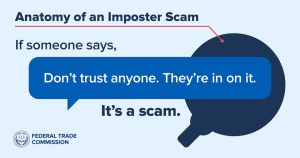
Things only scammers will say:
“Act now!” That’s a scam. Scammers use pressure, so you don’t have time to think. But pressuring you to act now is always a sign of a scam. It’s also a reason to stop.
“Only say what I tell you to say.” That’s a scam. The minute someone tells you to lie to anyone — including bank tellers or investment brokers — stop. It’s a scam.
“Don’t trust anyone. They’re in on it.” That’s a scam. Scammers want to cut you off from anyone who might slow you down.
“Do [this] or you’ll be arrested.” That’s a scam. Any threat like this is a lie. Nobody needs money or information to keep you out of jail, keep you from being deported, or avoid bigger fines. They’re all scams.
“Don’t hang up.” That’s a scam. If someone wants to keep you on the phone while you go withdraw or transfer money, buy gift cards, or anything else they’re asking you to do: that’s a scammer. DO hang up.
And here’s a list of things that only scammers will tell you to do:
“Move your money to protect it” is a scam. Nobody legit will tell you to transfer or withdraw money from your bank or investment accounts. But scammers will.
“Withdraw money and buy gold bars” is a scam. Always. Every time.
“Withdraw cash and give it to [anyone]” is a scam. Doesn’t matter who they say: it’s a scam. Don’t give it to a courier, don’t deliver it anywhere, don’t send it. It’s a scam.
“Go to a Bitcoin ATM” is a scam. Nobody legit will ever insist you get cryptocurrency of any kind. And there’s no legit reason for someone to send you to a Bitcoin ATM. It’s a scam.
“Buy gift cards” is a scam. There’s never a reason to pay for anything with a gift card. And once you share the PIN numbers on the back, your money’s as good as gone.
If you see or hear any version of any of these phrases, you’ve just spotted a scammer. Instead of doing what they say, stop. Hang up. Delete the email. Stop texting. Block their number — anything to get away from them. And then, tell someone you trust and report the scam to the FTC: ReportFraud.ftc.gov.
Source: Sure ways to spot a scammer | Consumer Advice (ftc.gov)
It Happened to me … and it Could Happen to You.
-Submitted by an NHFCU employee!
March 15, 2024

Anyhow, I needed to shut my card off NOW. So, what to do?? I know we have the VISA debit and credit lost and stolen numbers listed on our website (because I put them there). But then I also remembered I can control my debit card on the NHFCU mobile app on my phone or iPad. I still had the app open on my phone. On the bottom of my screen, I pressed “Cards.” Then a screen came up with a picture of my card and a button underneath (which was green at the time). I simply touched it to turn my card off. Nothing else could be charged using that card number! When I got to the office, I reached out to our Operations Department to make them aware of the fraud situation. They worked to report my card as stolen, had me sign an affidavit and tell them what was mine and what was not as far as transactions. They also ordered a new debit card for me. I was granted provisional credit for the transactions in dispute. At NHFCU, provisional credit is normally granted within 10 business days. This is the term they use because until the investigation is complete (which can take several months), they cannot promise that I will get my money back but can grant me “provisional credit”. If cash flow is a concern for you (not having funds available immediately), consider using our VISA credit card for your regular purchases.
That way, in the event your card information is compromised, your checking account funds are not impacted at all, and you can afford the time needed to correct the situation. Want to know more? Talk to one of our financial services representatives today. Call (603)224-7731 ext. 504.
Is it scary to see money disappear and know you did not benefit IN ANY WAY from the purchases made? Yes. But the other great thing I can share is that I was ALWAYS confident about how this works, because I work for NHFCU. I was not given special treatment – THIS IS HOW IT ALWAYS WORKS WHEN THERE IS LEGITIMATE FRAUDULENT USE of your debit card. (That means I did not give my card number or PIN out to someone who decided to go shopping.)
I hope this helps others understand there is a way to handle the issue quickly. To those who would say they won’t use a debit card for JUST THIS REASON, I urge you to rethink it. If you had cash or checks stolen, your only recourse would be through the police and a thorough investigation where the perpetrators are apprehended. And even then, it is VERY UNLIKELY that you would get your money back at all.
Celebrate National Consumer Protection Week. Talk About Scams.
That call or text might not seem like a scam. It might look like it’s Apple or Microsoft, saying there’s a problem with your computer. (It’s not.) It might seem like it’s Amazon, saying there’s a problem with an order. (Also no.) It might even sound like your grandchild, calling with (supposedly) an emergency. (Still no.) All of these are scammers. This is National Consumer Protection Week (NCPW) and we’re inviting you to join us in talking about scams just like these.
Scammers target everyone, in any language. But research and experience show that talking about scams helps us avoid them. So, this NCPW, let’s talk about scams. Start a conversation to share what you learned about how to spot, avoid, and report scams. Maybe even reach out to someone who might need a little extra help or information. Celebrate National Consumer Protection Week. Talk about scams | Consumer Advice (ftc.gov)
How To Avoid a Fake Check Scam
In a fake check scam, an unknown individual asks you to deposit a check. The amount is usually more than owed to you, and sometimes exceeds several thousand dollars. You are then instructed to send a portion of the money back to them or another person.
Scammers always provide a convincing explanation for why you can’t keep all the money. They may claim it’s for taxes or fees, purchasing job supplies, returning an overpayment, or other reasons. However, this is a scam. Check out the video for some examples of check scams.
- Do not use money from a check to send gift cards, money orders, cryptocurrency, or to wire money to anyone who requests it. Scammers often ask for gift cards, cryptocurrency, or wire transfers, and once you’ve sent the money, it’s nearly impossible to recover.
- Reject offers that require payment for a prize. Legitimate prizes should not require payment.
- Never accept a check for more than the selling price, as it is likely a scam.
For additional information visit the FTC’s website at: https://consumer.ftc.gov/articles/how-spot-avoid-report-fake-check-scams
Once You’ve Been Scammed, You’re More Likely to Be Targeted Again
1/5/2024
Refund and Recovery Scams directly target those who have been scammed in the past. Whether it’s you, a friend or family member, scammers target “easy” victims. And share the names of their successes. Here is a breakdown of how these scams happen and how to avoid them.
Refund and Recovery Scam:
- Scammers target someone who has been scammed before.
- Scammers are able to do this by re-targeting their past victims or by purchasing “sucker lists” (lists of people who have been scammed) from other scammers.
- They gain your trust by claiming they are with a law firm, a government agency, a consumer advocacy group or some other organization.
- They ask for your personal information claiming it is to help you as well as ask for a “fee” such as money to cover “administrative charge,” “retainer fee,” “processing fee,” “tax,” or even a “shipment and handling charge.”
- They then ask for information such as your social security number, checking, debit, or other financial account number claiming they need it so they can process your refund.
Don’t be a victim … again. These are all examples Refund and Recovery Scam.
Ways to Avoid a Refund and Recovery Scam:
- Don’t trust solicitations claiming your money can be recovered.
- Don’t give out personal information.
- Don’t pay for a refund. Scammers often ask for cash, gift cards, cryptocurrency, wire transfers or payments through payment apps.
- Don’t deposit refund checks especially if it’s for an amount larger than your original loss.
- Research anyone that solicits you to recover lost money.
For more information on Scams and Fraud continue reading this page or visit the FTC’s website at https://consumer.ftc.gov/articles/refund-and-recovery-scams
Spot Holiday Job Scams
12/8/2023
Job scams are common during the holiday season. The scammers on legitimate employment sites try to lure in job applicants. They might offer you the job quickly and ask for your personal information like your driver’s license, Social Security, or bank account number to fill out their “employment paperwork.” However, once you provide it, they might steal your identity.
- First, do research. Contact the company directly using a phone number or e-mail you know is legitimate – not the one you saw advertised on a website. See what others have said about it online.
- Next, search online for the company name and the words “review,” “complaint,” or “scam” to get an idea of what other people have experienced. Be sure to contact the FTC if you spot a scam!
- Finally, talk to someone you trust before taking any job offer or business opportunity. What do they think? And if something sounds fishy, do not hesitate to reach out to the FTC at ReportFraud.ftc.gov.
For more information visit ftc.gov/JobScams
Fraud Discovered Locally in Concord, Skimmers found on card readers in several stores
Dear Members,
By now you’ve probably heard that both Market Basket and Walmart in Concord were each the target of fraudsters, who placed skimmers on point-of-sale card terminals. Despite just making the news, these skimmers were actually discovered in October. Skimmers were also found at a Market Basket in Nashua, as well as at a few Massachusetts locations. There may very well be more out there.
At this point it appears to be limited to certain point of sale card terminals in each store, generally at the quick checkout or self-checkout lanes.
Although we have had no reports of fraud related to this issue, it is important that you review your accounts on a regular, frequent basis. Not only do you receive monthly or quarterly statements, you have options available to review your account anytime, 24/7/365, via the following channels:
· NHFCU E-Branch;
· NHFCU Mobile App, where you can also set up alerts for debit card activity; and
· Direct Line (Basic account access only; Visa credit card activity is not accessible).
We will make every effort to assist you, our valued members, but remember it is your responsibility to monitor your account and report any unauthorized transactions to us.
Sincerely,
Rodney Dauteuil, CIA, CFSA, CUCE, NCRM
Vice President, Compliance and Risk Management
New Hampshire Federal Credit Union
Scammers call or email, pretending to be from the VA or your home loan servicer. They claim if you pay them an upfront fee, they can get you a loan modification or refinancing to avoid foreclosure, so you can keep your home. But that’s illegal. Do you know your rights when it comes to getting relief for your mortgage debt?
- Don’t pay any money until the company delivers the results you want. The Mortgage Assistance Relief Services (MARS) Rule (also called Regulation O) makes it illegal for a company to charge you a penny unless it’s given you a written offer for a loan modification or other relief from your lender or servicer — and you accept the offer.
- Before you sign with them, the company must tell you
- they’re not associated with the government or your lender
- that your lender might not agree to change the terms of your mortgage, and
- the total fee the company will charge for its services
- Before you decide to accept an offer of mortgage relief, the company must
- give you a document from your lender or servicer showing their offered changes to your loan, and
- tell you that if you don’t want to accept the offer, you don’t have to pay the company’s fee
You always have the right to contact your lender or servicer directly to see whether you have other options. Companies that tell you to stop communicating with your lender or servicer are breaking the law.
If you’re having trouble paying your mortgage, connect with a VA loan technician. The VA offers help with discussing your loan with your servicer. Learn more about VA’s help to avoid foreclosure.
If you see these practices, tell the FTC at ReportFraud.ftc.gov.
As we approach Veterans Day, we thank our veterans for their service and sacrifice. But not everyone has a vet’s best interests in mind. Whether you left the service decades ago or you’re planning your transition to civilian life, scammers will try to get you to send money or share personal information. Scammers also want to get their hands on the valuable benefits you earned through military service. What are some ways to know you’re dealing with a scammer?
First know how scammers operate. Imposter scams come in many varieties but they work the same way: scammers call, text, email, or reach out over social media and pretend to be someone you trust to convince you to send them money. Scammers may pretend to be from a government agency and say you need to pay a fine. Or they may pose as an online love interest who needs you to send money for an expensive medical procedure. The scammer may offer you a job, too, but say you need to pay a fee before you get hired. Scammers may claim to have some affinity with the military to gain your trust so you won’t dig too deep into what they’re saying.
Second, know how scammers ask you to pay. No matter what the story is, only scammers will insist that the only way you can pay is by cash, gift card, cryptocurrency, payment app, or a wire transfer service. These methods make it almost impossible to get your money back, which is why scammers insist you pay that way. Stop. Don’t pay.
Over the next few weeks, we’ll highlight some of the ways scammers try to get at your veterans benefits — and ways you can spot and avoid those scams. One way to recognize Veterans Day is to share the advice about avoiding scams and encourage the veterans you know to sign up for the latest updates to stay a step ahead of scammers.
You now have permanent access to free weekly credit reports
The three national credit reporting agencies — Equifax, Experian, and TransUnion — have permanently extended a program that lets you check your credit report at each of the agencies once a week for free.
Visit AnnualCreditReport.com to request free copies of your credit reports. Other sites may charge you or be fraudulent sites set up to steal your personal information.
By law, everyone is entitled to one free credit report every twelve months from each of the three credit reporting agencies. In 2020, soon after the COVID-19 pandemic upended the finances of millions of people, the three agencies announced they would temporarily make free reports available every week. The program was extended twice and is now permanent.
Why check your credit report? Your report shows things like how many credit cards and loans you have, whether you pay your bills on time, and whether any debts have been turned over to collections. Creditors, insurers, some employers, and other businesses use it to decide if they want to do business with you — and the terms they’ll offer you.
Mistakes, like accounts or bankruptcies that aren’t yours, can hurt your credit, increase how much you’ll have to pay to borrow money, and even derail your chances of getting a loan, insurance, a rental home, or a job. Mistakes can result from errors by businesses that report credit information to credit reporting agencies. They also can be a sign of identity theft. The sooner you spot a mistake, the sooner you can dispute the error or — if it results from identity theft — report it at IdentityTheft.gov.
To learn more about why your credit matters, read Understanding Your Credit.
Updated October 13, 2023 to reflect the permanent extension of free weekly credit reports. Updated September 23, 2022 to reflect the extension of weekly free credit reports through December 2023. Updated May 2, 2022 to reflect the extension of weekly free credit reports through December 2022.
If you paid a scammer with a gift card, is your money gone? Maybe not – solutions on our website work for local member
You may recall the FTC article we published about gift card scams last month. Well, it came in handy in a BIG way.
Last Thursday, a local member – a very bright woman – became the victim of a social media scam. Here’s what happened to her:
- She received a message on a social media platform from a family member she was “friends” with.
- This family member/friend engaged the woman in some friendly chit chat conversation online (warming up).
- Then, the scammer (continuing to use the profile of a family member) informed the woman about a terrific investment she just took advantage of, offering to refer the woman to her consultant.
- Having completed the “referral” process, a consultant telephoned and used online messaging to guide the woman toward making an investment – a sure thing – but the consultant needed funds as soon as possible…suggesting the use of a cash app (which the woman wisely declined), asking for personal account info (also declined), and then asking for gift cards for payment, requesting the cards be scanned online.
- The woman did buy the gift cards. She went to several stores to buy them. Alarms were going off but, this was a family member who she had been conversing with first, someone who would not steer her wrong…When she tried to take photos and upload the gift cards, another a family member who had dropped by questioned the process. After a quick phone call to NHFCU and a visit to our website, the woman realized it was a scam. So, she followed the instructions in the article below and was able to get those gift cards cancelled!
It is important to note that this scammer spent HOURS working this person through online messaging and phone calls about the opportunity – more than 24 hours all together. This continued even after the woman stopped communicating (and the scammer became rude and threatening).
Please take this opportunity to familiarize yourself with the tactics scammers use. Share this article with your family and friends.
Did you receive a letter from PBI?
Many of our members, who are past or present State of New Hampshire employees, recently received a letter from Pension Benefits Information, LLC (“PBI”), informing them of a “global third-party software event that impacted PBI and may affect the security of [their] personal information.” The letter goes on to say that there was a “vulnerability” in MOVEit Transfer software and “the software could be exploited by an unauthorized third party.”
The letter states that PBI is offering 24 months of complimentary credit monitoring and explains the necessary steps for enrolling. The letter also provides information about how to place a freeze or fraud alert on your credit report through the three major credit bureaus.
Consumers can obtain a free credit report annually from all three credit bureaus at www.annualcreditreport.com. This is the only official free credit report website.
Additional information on protecting your personal information can be found through The Federal Trade Commission’s website at www.identitytheft.gov or by calling 1-877-ID-THEFT (1-877-438-4338).
Suspicious Activity
If you think you have been the victim of fraud, if you doubt the authenticity of a solicitation, notice or email regarding your NHFCU account or you suspect your account has been compromised, contact us at (603) 224-7731, or 1 (800) 639-4039.
If you paid a scammer with a gift card, is your money gone? Maybe not
By Cristina Miranda, Consumer Education Specialist, FTC
Did someone tell you to buy a gift card and give them the numbers? That’s a scam. Your money was gone the moment you gave someone those gift card numbers. But now, some gift card companies might be able to get your money back.
Gift card scams start with calls, texts, emails, or social media messages.
The scammer pretends to be someone they’re not: a company, the government, a family member, or romantic interest. Their message is always urgent. And they want money. They’ll tell you to buy a gift card or maybe multiple gift cards. Once you do, they’ll demand you send a photo of the card or give them the numbers on the back of the card.
But now, some gift card companies are flagging fraudulent transactions and freezing stolen gift card money so that scammers can’t get it. And those gift card companies want to give that money back.
And those gift card companies want to give that money back.
So, if a gift card scam happens to you, act fast:
- Report it to the gift card company. Tell them you were scammed. Give the gift card company the information from your receipt or a copy of the numbers on your gift card.
- Ask for your money back. Once you report a gift card scam to the gift card company, ask for your money back. If the money was frozen or not downloaded by the scammer, some gift card companies will give the money back.
- Tell the FTC at ReportFraud.ftc.gov. Your report makes a difference and helps #stopscams.
The faster you contact any gift card company to report a gift card scam, the better the chance of getting your money back. But it doesn’t matter when you were scammed with a gift card. For more information about avoiding and reporting gift card scams, visit ftc.gov/giftcards.
What’s a Credit Freeze?
Credit Freezes
A credit freeze is the best way you can protect against an identity thief opening new accounts in your name. When in place, it prevents potential creditors from accessing your credit report. Because creditors usually won’t give you credit if they can’t check your credit report, placing a freeze helps you block identity thieves who might be trying to open accounts in your name.
A freeze also can be helpful if you’ve experienced identity theft or had your information exposed in a data breach. And don’t let the “freeze” part worry you. A credit freeze won’t affect your credit score or your ability to use your existing credit cards, apply for a job, rent an apartment, or buy insurance. If you need to apply for new credit, you can lift the freeze temporarily to let the creditor check your credit. Placing and lifting the freeze is free, but you must contact the national credit bureaus to lift it and put it back in place.
Place a credit freeze by contacting each of the three national credit bureaus, Equifax, Experian, and TransUnion. A freeze lasts until you remove it.
Learn more about credit freezes, fraud alerts, and active-duty alerts for service members. And, if identity theft happens to you, visit IdentityTheft.gov to report it and get a personal recovery plan.
Did you receive a letter from PBI?
Many of our members, who are past or present State of New Hampshire employees, recently received a letter from Pension Benefits Information, LLC (“PBI”), informing them of a “global third-party software event that impacted PBI and may affect the security of [their] personal information.” The letter goes on to say that there was a “vulnerability” in MOVEit Transfer software and “the software could be exploited by an unauthorized third party.”
The letter states that PBI is offering 24 months of complimentary credit monitoring and explains the necessary steps for enrolling. The letter also provides information about how to place a freeze or fraud alert on your credit report through the three major credit bureaus.
Consumers can obtain a free credit report annually from all three credit bureaus at www.annualcreditreport.com. This is the only official free credit report website.
Additional information on protecting your personal information can be found through The Federal Trade Commission’s website at www.identitytheft.gov or by calling 1-877-ID-THEFT (1-877-438-4338).
Suspicious Activity
If you think you have been the victim of fraud, if you doubt the authenticity of a solicitation, notice or email regarding your NHFCU account or you suspect your account has been compromised, contact us at (603) 224-7731, or 1 (800) 639-4039.
8/21/2023
If you paid a scammer with a gift card, is your money gone? Maybe not
Did someone tell you to buy a gift card and give them the numbers? That’s a scam. Your money was gone the moment you gave someone those gift card numbers. But now, some gift card companies might be able to get your money back.
Gift card scams start with calls, texts, emails, or social media messages. The scammer pretends to be someone they’re not: a company, the government, a family member, or romantic interest. Their message is always urgent. And they want money. They’ll tell you to buy a gift card or maybe multiple gift cards. Once you do, they’ll demand you send a photo of the card or give them the numbers on the back of the card.
But now, some gift card companies are flagging fraudulent transactions and freezing stolen gift card money so that scammers can’t get it. And those gift card companies want to give that money back.
So, if a gift card scam happens to you, act fast:
- Report it to the gift card company. Tell them you were scammed. Give the gift card company the information from your receipt or a copy of the numbers on your gift card.
- Ask for your money back. Once you report a gift card scam to the gift card company, ask for your money back. If the money was frozen or not downloaded by the scammer, some gift card companies will give the money back.
- Tell the FTC at ReportFraud.ftc.gov. Your report makes a difference and helps #stopscams.
The faster you contact any gift card company to report a gift card scam, the better the chance of getting your money back. But it doesn’t matter when you were scammed with a gift card. For more information about avoiding and reporting gift card scams, visit ftc.gov/giftcards
8/7/2023
How to spot and avoid post-disaster scams in the Northeast
As recovery efforts continue in areas of the Northeast hit hard by devastating flooding, scammers aren’t far behind. Your tragedy is an opportunity for them, and they’ll try to take advantage. If one of the recent storms damaged your home, you might get offers to do things like help you clean up debris or get financial help. The offer might even seem to come from a government official. But how do you know what’s real?
The first thing to know is this: Walk away from anyone who demands personal information or money upfront. Here are some other ways to spot and avoid scams:
- Know that FEMA doesn’t charge application fees. If someone wants money to help you qualify for FEMA funds, that’s a scam.
- Be skeptical of anyone promising immediate clean-up and repairs. Those are dubious at best and a scam at worst. You’ll wind up with outrageously high price quotes, demands to pay up front, “help” without the necessary skills, and maybe even your money just vanishing.
- Check contractors out. Before you pay, ask for their IDs, licenses, and proof of insurance. Don’t believe any promises that aren’t in writing.
- Never pay by wire transfer, gift card, cryptocurrency, or in cash. Scammers want you to pay that way because they get your money quickly and it’s almost impossible for you to get it back. And never make the final payment until the work is done and you’re satisfied.
- Guard your personal information. Only scammers will say they’re a government official and then demand money or your credit card, bank account, or Social Security number.
- Spot rental listing scams. If anyone asks for a security deposit or rent before you’ve met or signed a lease, steer clear.
- Spot disaster-related charity scams. Scammers know how to seem like a real charity when they’re really just on the take. Before you give, check out how to donating while avoiding charity scams.
Suspect a scam? Report it to the FTC at ReportFraud.ftc.gov.
Protect Your Account: How to Limit Your Potential Loss
7/20/2023
…If your credit or debit card is lost or stolen.
How To Limit Your Losses
Under federal law, you have protections that help limit what you have to pay if your credit or debit cards are lost or stolen.
|
|
|
|
Protect Your Account
7/14/2023
What to do if your credit or debit card is lost or stolen
What do you do first?
- “Turn off” the debit card as soon as you realize it is missing. The easiest and fastest way to do this is through our app. Download our app for Apple Devices or Android Devices.
- Report Loss or Theft Immediately. If your credit or debit card is lost or stolen report it as soon as possible.
- Call — or get on the mobile app — and report the loss or theft to NHFCU as soon as possible.
- To report a lost or stolen VISA Credit or VISA Debit Card during business hours call (603)224-7731 or 1(800)639-4039.
- To report a lost or stolen VISA Credit or VISA Debit Card after our regular hours please use the numbers below:
After Hours Report Lost/Stolen VISA Credit Cards:
In U.S. 1 (855) 445-1231 Outside U.S. (301) 837-8410 (collect)
After Hours Report Lost/StolenVISA Debit Cards:
In U.S. (800) 472-3272 Outside U.S. (410) 581-9994 (collect)
Follow up immediately in writing.
Watch Your Accounts
- Monitor your account. Call to report fraudulent charges as soon as you spot them.
- Follow up immediately in writing or by sending a message through e-branch. Send a letter to NHFCU at 70 Airport Road, Concord, NH 03301. Confirm you reported the fraudulent charge or withdrawal. Include the date and time when you noticed your card was missing, and when you first reported the loss.
- Check if your homeowner’s or renter’s insurance covers card thefts. If not, ask your insurance company to include this protection in your policy going forward.
- Check your credit reports. Get copies of your free credit reports to monitor for accounts or charges you don’t recognize. If you suspect identity theft, visit IdentityTheft.gov to report it and get a recovery plan.
Limit Your Losses
Under federal law, you have protections to help limit what you have to pay if your credit or debit cards are lost or stolen…
Check back next week for part 2 on how to limit your losses.
If you see a scam, fraud, or a bad business practice, tell the FTC. Go to ReportFraud.ftc.gov, the FTC’s website that makes it easy for you to report.
7/14/2023
Military Romance Scams
These scammers may steal photos of real military personnel for their profiles. They might say they need cash to apply for a “leave request” to visit you. Or to pay for food and medical treatment during their deployment. One recent twist involves romance scammers pretending to be U.S. troops deployed to Ukraine where there’s no U.S. military presence. The scammers ask you to send them care packages by wiring money through an official-looking (but fake) military website. (Service members never have to pay to get packages, food, medical treatment, or to take leave.)
How can you avoid a romance scam?
If an online love interest asks you for money — especially using gift cards, wire transfers, payment apps, or cryptocurrency — that’s a scam. Period.
If someone appears on your social media and rushes you — to start a friendship or romance, or to get into a “great” investment opportunity (maybe in crypto) — slow down. Talk to someone you trust before you respond. Try a reverse image search of profile pictures. If the details don’t match up, it’s a scam.
If you suspect someone is a scammer, cut off contact. Tell the online app or social media platform right away, and then tell the FTC at ReportFraud.ftc.gov.
7/6/2023
Prevent Account Fraud and Identity Theft
PROTECT YOUR PERSONAL INFORMATION
Protecting your personal and account information is our top priority. At NHFCU, your information is safe and secure. With account fraud and identity theft on the rise, it is important for you to help protect yourself. Here are a few tips:
Education
Skilled identity thieves use a variety of methods to gain access to your personal information. The best way to protect your identity is to educate yourself and be aware of common scams. Visit nhfcu.org/FraudSecurity on our website for information on current scams, and links to additional resources.
Credit Report
Combat fraudulent activity by monitoring your credit report. If accounts are opened in your name, they will appear on your credit report. Consumers can obtain a free credit report annually from all three credit bureaus at www.annualcreditreport.com. This is the only official free credit report website.
Online and Mobile Banking
Prior to entering your account information, verify that you are using our website: www.nhfcu.org and not a spoofed site (fake email or website address that looks legitimate). Always be sure to log out of online or mobile banking before closing the window or app. Never store your personal or account information in plain text on your computer or mobile device. Consider using a secure wallet to securely store your account information and passwords.
Personal Information
NHFCU will never contact you by phone, email or text asking you to provide account numbers, passwords, social security numbers or other personal information. Do not respond and notify us immediately if you receive such a request. And if you receive an email or text asking you to log into your account, do not click on any links or respond. Instead, call us directly. This is true for most companies that you do business with. Thieves can impersonate real companies through email, text and phone in order to steal your information. Call the company directly to verify the legitimacy of the request.
Suspicious Activity
If you think you have been the victim of fraud, if you doubt the authenticity of a solicitation, notice or email regarding your NHFCU account or you suspect your account has been compromised, contact us at (603) 224-7731, or 1 (800) 639-4039.
June 9, 2023
The Risks of Using Mobile Payment Apps from the Consumer Financial Protection Bureau
consumerfinance.gov

Everyone knows the benefits of keeping your money at a credit union — it’s insured by NCUA. But do you know the risk of leaving your money in a third-party nonbank payment app such as PayPal, Venmo or Cash app?
More than three quarters of adults in the United States have used a payment app, sometimes called a P2P (peer-to-peer or person-to-person) app. The apps can be used on a computer or mobile device to send money to someone else without writing a check or handing over cash.
Money stored in nonbank payment apps often is not protected by federal deposit insurance.
Nonbank payment apps help you move money into and out of a linked bank account, credit union account, or card account. They also let you store money inside the app. In fact, money you receive generally stays in your payment app account until you connect to the app and move the money to your linked bank or credit union account.
Keeping money inside your nonbank payment app might feel the same as keeping money in a traditional bank account with deposit insurance. You can check your balance and review transactions, just as you might do with online banking. However, the difference is that the money in your app might not be held in an account at an FDIC member bank or NCUA member credit union.
This means it might not be protected by deposit insurance.
The difference is key – money you keep in your bank or credit union account is insured if the bank or credit union fails. However, deposit insurance does not apply when a nonbank payment company fails.
If a payment app’s business fails, what happens next is often unclear
Apps can be set up in different ways, with different business models, investment strategies, and risks. Your payment app company might invest your money in loans and bonds, instead of keeping the money in a bank or credit union account. The company can earn money on these investments, while generally paying no interest to you. The payment app’s business could be at risk from investment losses, interest rate changes, currency exchange rates, and liquidity problems. What happens in the case of the nonbank payment app’s business failure or bankruptcy?
In contrast, The Federal Deposit Insurance Corporation (FDIC) and National Credit Union Administration (NCUA) protect deposits up to $250,000 under the same owner or owners. If your bank or credit union fails, you still have quick access to your money.
If the nonbank payment app’s business fails, your money is likely lost or tied up in a long bankruptcy process. You might be standing in line with other lenders to the failed app, waiting to see if you can get any of your money back after the business is unwound.
Some apps offer “pass-through” insurance, if you take additional steps
Some apps may claim to provide pass-through insurance through business arrangements with a bank or credit union for customers who sign up for additional services. For example, you might have to get a company-branded card or choose direct deposit. To be eligible for pass-through insurance, the account must comply with certain rules and regulations set by the FDIC or NCUA.
Pass-through insurance means you are insured against the failure of the bank or credit union where the app holds the money for you. It doesn’t insure you against the failure of the payment app company. This means there could be a risk of losing your money in the event the company fails. If the payment app company followed all the relevant requirements, though, your money could be safe in the associated bank or credit union. Still, there could be risks, like delaying your ability to access your money.
Tip: Get in the habit of moving your money from the app to your insured account as soon as you receive it.
Additional information on payment app scams can be found here consumerfinance.gov
Considering deleting your payment app? Make sure to first remove access to your financial institution/credit card, next delete your account before uninstalling the app from your device.
June 2, 2023
Managing Your Passwords with Tips From FTC
FTC.gov
How To Keep Your Password Secure
- Make sure your password is at least 12 characters. Consider using a passphrase of random words. Make your password stronger by mixing uppercase and lowercase letters, numbers, and symbols.
- Use different passwords for different accounts. That way, if a hacker gets your password for one account, they can’t use it to get into your other accounts.
- Use multi-factor authentication when possible. Multi-factor authentication falls into two categories:
- a passcode you get via an authentication app or a security key.
- a scan of your fingerprint, your retina, or your face.
- Consider storing your passwords and security questions in a reputable password manager. To find a reputable password manager, search independent review sites, and talk to friends and family for ones that they use. Use a strong password to secure the information in your password manager.
- Pick security questions only you know the answer to. Avoid providing answers that are available in public records or easily found online, like your zip code, birthplace, or your mother’s maiden name. And don’t use questions that attackers can easily guess — like the color of your first car. You can even use nonsense answers to make guessing more difficult.
- Change passwords quickly if there’s a data breach on a website you use and on any account that uses a similar password. It is best to avoid using similar passwords.
Report Identity Theft
If someone is using your information to open new accounts or make purchases, report it and get help at IdentityTheft.gov.
For additional information on password best practices visit Password Checklist | Consumer Advice (ftc.gov)
May 17, 2023
By: Cristina Miranda, Consumer Education Specialist, FTC

Scammers are getting personal. You receive an email saying someone has access to your cell phone or your computer. And they’re about to make your sensitive videos, pictures, or compromising information public OR they will place illegal documents or photos on your computer. They say if you pay them money (a ransom), using a cryptocurrency, like Bitcoin-they won’t expose or incriminate you. Emails like these are common, they are a part of a cryptocurrency blackmail scam that’s been popping up for a while.
The person behind these emails is a scammer. Don’t pay him. He’s using threats, intimidation and high-pressure tactics to trick you out of your money. And while the scammer may say that he knows about an alleged affair, a video or something else that could embarrass you if it was made public, it’s all fake. In fact, it’s also a criminal extortion attempt. Which is why it’s really important that you report this type of scam to the FBI, right away. And once you do, remember to tell the FTC, too, at ftc.gov/complaint.
For additional information on scams, visit Scams | Consumer Advice (ftc.gov)
May 3, 2023
ALERT – 3rd Party Local Home Warranty Mailer
Please read your mail carefully. Several members have contacted us because they received a mailer stating their home warranty is expiring. The mailer appears to be a bill and something you must pay – and even indicates NHFCU as the mortgage institution. This is a common marketing tactic as this information is available publicly.
NHFCU is not selling your information, nor are we affiliated with these home warranty mailings. We DO NOT sell your information to 3rd parties.
To understand how and when we share your information, click here for our privacy notice.
April 20, 2023
Are you Really the Lucky Winner? Spot the Prize Scams
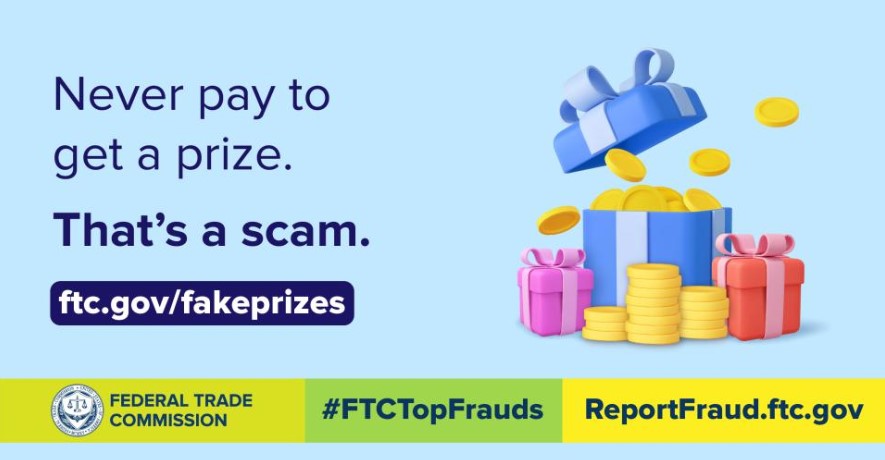
- Don’t pay to get a prize. Real prizes are free. Anyone who asks you to pay a fee for “taxes,” “shipping and handling charges,” or “processing fees” to get your prize, is a scammer. Stop and walk away.
- Don’t give your financial information. There is absolutely no reason to ever give your bank account or credit card number to claim a prize. If anyone asks for it, it’s a scam.
- Don’t give your personal information. Scammers hope you’ll click on links that will take your personal information or download malware on your device. Delete the message without clicking on the links and don’t respond.
March 21, 2023
Dirty Dozen: Watch out for scammers using email and text messages to try tricking people during tax season
IRS.gov
The Internal Revenue Service urges everyone to remain vigilant against phishing and smishing schemes where cybercriminals try to steal a taxpayer’s information through scam emails or text messages.
“Email and text scams are relentless, and scammers frequently use tax season as a way of tricking people,” said IRS Commissioner Danny Werfel. “With people anxious to receive the latest information about a refund or other tax issue, scammers will regularly pose as the IRS, a state tax agency or others in the tax industry in emails and texts. People should be incredibly wary about unexpected messages like this that can be a trap, especially during filing season.”
- Phishing is an email sent by fraudsters claiming to come from the IRS or another legitimate organization, including state tax organizations or a financial firm. The email lures the victims into the scam by a variety of ruses such as enticing victims with a phony tax refund or frightening them with false legal/criminal charges for tax fraud.
- Smishing is a text or smartphone SMS message that uses the same technique as phishing. Scammers often use alarming language like, “Your account has now been put on hold,” or “Unusual Activity Report” with a bogus “Solutions” link to restore the recipient’s account. Unexpected tax refunds are another potential target for scam artists.
February 14, 2023
Have I told you lately that I love you – and how to avoid scams?
By Terri Miller, FTC Consumer Education Specialist, February 13, 2023
It’s almost Valentine’s Day. Maybe you’ve already sent a card to your grandmother, grandfather, or the older adult in your life. But if you haven’t told them lately that you love them, pick up the phone and call, too. While you’re catching up, remind them that you’ll never pressure them to wire you money or buy you gift cards — but a scammer might.
Scammers use fake family emergencies to target older adults. They call pretending to be a grandkid in trouble, or a lawyer or police officer on the scene. They ask for money, but once the grandparent finds out there was no emergency, the scammer’s gone — and so is their money. You may not get these scam calls, but chances are you know someone who will get one — if they haven’t already. Sharing is caring.
January 20, 2023
Fraud Alert to NHFCU Members – Rise in Local Financial Institution Impersonators
We are aware of fraudsters posing as representatives from various NH financial institutions – including NHFCU. These fraudsters are in contact with people primarily via cell phone and texting – even revealing a valid financial institution name on Caller ID (spoofing).
If you receive a call asking for any account information, Social Security Number, e-branch login, password, PIN, etc., hang up immediately and call us at (603)224-7731.
Here’s what you might see:
- Caller ID may appear as “UNAVAILABLE” and “WITHHELD”
- Caller ID may appear as “NHFCU”
- The caller asks you to verify your personal information, and/or to verify a one-time passcode they send to your mobile device.
- The imposter may tell you they are calling from the NHFCU Fraud Department asking for your personal information because “you’ve been a victim of fraud” and requests your Personal Identification Number (PIN) so they can deactivate it. They may also ask if you completed specific transactions and tell you they need more info from you to cancel them. These fraudsters are tricky and sound legit. Please call us directly at (603)224-7731 to verify whether we are trying to reach you.
When logging in to online banking, please do so directly from nhfcu.org or our mobile app. Know your information remains secure with NHFCU.
NHFCU does not ask for unsolicited personal information like your PINs and passwords when verifying your identity.
If you believe you are a victim of fraud or receive a suspicious call or text, please contact NHFCU immediately at (603)224-7731.
January 19, 2023 (posted January 20. 2023)
Facing the facts about fraud: It may not be the face you think
By Lesley Fair, FTC Blog, December 8, 2022
Ask someone to picture the typical person who has experienced a scam and they may think of an older consumer taken in by a fast-talking fraudster. Regardless of the image they create, the results of the FTC’s latest Consumer Protection Data Spotlight suggest their impression may not be accurate. That’s because reports in the FTC’s Consumer Sentinel contradict some stereotypes about how fraud affects our communities and evoke a more nuanced picture. Here are some of the surprising findings revealed in the Data Spotlight.
- Who’s losing money to fraud – and how much are they losing?
- In 2021, Gen Xers, Millennials, and Gen Z young adults – people between 18 and 59 – were 34% more likely than people 60 and over to report losing money to fraud. The median individual fraud loss reported by people in the 18-59 age group was $500.
- But the Data Spotlight also suggests that when older adults lose money due to fraud, they’re hit harder in the wallet. People between 70 and 79 reported median individual losses of $800. For those 80 and over, that number shot up to $1,500.
- Are there differences in the types of fraud different generations report?
Click here to read the full article.
If you suspect you are a victim of fraud, contact us immediately at (603) 224-7731. To report fraud to the FCT, click here: ReportFraud.ftc.gov.
December 21, 2022
What to do if your online order never arrives.
By Colleen Tressler, FTC, Division of Consumer and Business Education, December 12, 2022
We’ve all been there. During the holidays you order something online and anxiously await its arrival. But then your package doesn’t come when the seller said it would. And worse, you hear nothing. Your happy anticipation is turning to anger and frustration. So now what?
If you didn’t get your stuff:
- First, contact the seller. Most businesses will work with you to resolve the problem and keep you as a customer.
- If that doesn’t work, you still didn’t get your order and the charge shows up on your credit card statement, dispute the charges.
- If you paid by debit card, contact your debit card company (often your bank or credit union). Ask if they can help you. This sample letterfor disputing debit card charges can help.
Click here to read the full article.
Watch for fraud and scams during the holidays.
Fraud and scams are everywhere and increase exponentially during the holidays. Watch your emails and texts for suspicious messages -don’t click on them. Be vigilant about phone calls – don’t give out personal information inducing your bank account and Social Security number. Be sure to contact us immediately if you suspect you’ve become a victim of fraud at (603) 224-7731. Scroll down to review last month’s article about the uptick in fraud.
November 4, 2022 –
Special notice to NHFCU Members – Uptick in scams and fraudulent activity
Special Notice to NHFCU Members – Uptick in scams and fraudulent activity
Please know this latest scam has affected several NHFCU members.
Publisher’s Clearing House Fraud – Several members have reported getting calls from Publisher’s Clearing House telling them they have won a prize. The scam typically starts with a phone call. The caller pretends to be from Publisher’s Clearing House and explains you’ve won their jackpot, and YOU need to pay them a sum of money to cover certain expenses. Next, the caller may request your account details, social security number, and other personal information, all under the guise of making sure they got the right person. The scammer may call back several times, cultivating a relationship with you, promising you they will be at your house on a certain day. And then…usually, “something comes up” and they can’t make the appointment. At this point, they may ask you to send MORE money to cover unexpected taxes, fees, or other costs.
If you get one of these calls, DO NOT COOPERATE. Hang up and block their number immediately. Then:
- Notify your local police.
- Contact us immediately at (800) 639-4039.
- Go to reportfraud.ftc.gov and report the fraud online
This is a well-known national scam. A legitimate sweepstakes will NEVER ask you to pay any money to them, much less ask for your social security number or bank account information.
These scammers are clever. They are good at what they do. They will sound convincing to get you hooked. They will act as your cherished friend, but in reality, all they want is your money and your identity.
If you have been contacted by one of these scammers and have provided your NHFCU account information, please contact us AT ONCE at 800-639-4039, so we may try to protect you and your money.
Other scams and fraud schemes to be aware of:
- Romance Scam – Online dating can be a great way to find lasting love, but you don’t have to be looking for love to be courted by a romance scammer.
- Family emergency scam/grandparent scam – The first call is from a grandchild “in jail” to a grandparent. The second call is a lawyer pressuring the grandparent to wire/send bail money NOW.
- To see a list of all scams and sign up to receive emails from the FTC about all scams, go to ftc.gov/scams
What to do if you’ve been defrauded
- To report fraud, go to ftc.gov
- For other ways to protect yourself, please go to org/fraud-and-security
- As always, if you think you are a victim of a scam/fraud, contact us immediately at (800) 639-4039.
How to protect your home Wi-Fi network
Your home networks might have a range of wireless devices on them — from computers and phones to IP cameras, voice assistants, smart TVs, and connected appliances. Taking some basic steps to secure your home Wi-Fi network will help protect your devices from getting hacked — and your information from getting stolen.
The upside of Wi-Fi? You can connect to the internet wirelessly. The downside? Others nearby who connect to your unprotected network might be able to see what you do online, including your personal information. And if anyone uses your network to commit a crime or send illegal spam, the activity could be traced back to you.
Protect yourself and your home Wi-fi network from scammers and fraud – Click here for the full article from the FTC.
September 13, 2022 –
Protecting your Social Security number from identity theft
August 25, 2016 • By Doug Walker, Deputy Commissioner, Communications. SSA.gov (Last updated August 19, 2021)
Every year, millions of Americans become victims of identity theft. Identity theft occurs when someone steals your personally identifiable information and pretends to be you. They can use this information to open bank and/or credit card accounts, file taxes, or make new purchases in your name.
It is important that you take steps to protect your Social Security number from theft. If someone obtains your Social Security number, they can use it to get other personal information about you, including your banking and/or credit report information. Someone can steal your Social Security number by:
Stealing your wallet or purse.
Raiding your mailbox which may contain paper statements.
Obtaining personal information, you provide to an unsecured site on the Internet.
Rummaging through your trash.
Posing by phone or email as someone who needs information about you.
To read the full article, click here.
August 16, 2022 –
Multi-Factor Authentication is a good thing
Excerpts taken from “Protect your personal information,” ftc.gov article/secure your accounts.
So, you have your passwords for your personal computer, mobile phone and tablets set up, and your antivirus software and firewall programs are up-to-date to keep them working properly. You’re feeling pretty good about protecting your personal information.
While you’re on the right track, you can do more to avoid scammers, hackers, and other bad guys who try to steal your personal information online. It’s a good idea to know how to lock down your devices, network, and information. That way, your passwords, Social Security number, or account numbers don’t go speeding along the superhighway to the scammers.
In addition to your passwords and software/firewall protection, you can add another layer of protection from the bad guys. Set up multi-factor authentication (MFA) to safeguard your personal information. MFA is available with some accounts which offer extra security by requiring two or more credentials to log in to your account. These additional credentials fall into two categories:
Something you have, like a passcode you get via an authentication app, a security key, email, text, and phone.
Something you are, like a scan of your fingerprint, your retina, or your face.
MFA makes it harder for scammers to log in to your accounts if they do get your username and password. Yes, it’s one more thing to do with technology, but it’s crucial.
Be sure you use this authentication process to continue to protect your personal information and keep the bad guys away!
If you think you are a victim of fraud, contact us immediately at (603) 224-7731. If you think someone has gotten into your accounts or has your personal information, visit IdentityTheft.gov.There, you’ll get steps to take to find out if your identity has been misused, and how to report and recover from identity theft.
For detailed information from the FTC on how to keep your personal information safe, click here.
July 15, 2022
How to keep your passwords secure
Passwords are the locks on your account doors. You keep lots of personal information in your online accounts, including your email, bank account, and your tax returns, so you want good protections in place. Click here to review the password checklist to make sure your passwords are secure.

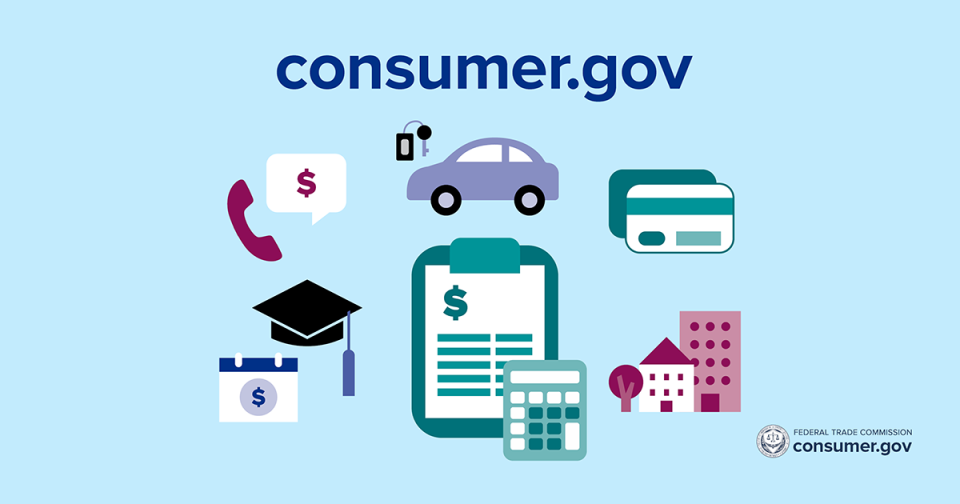
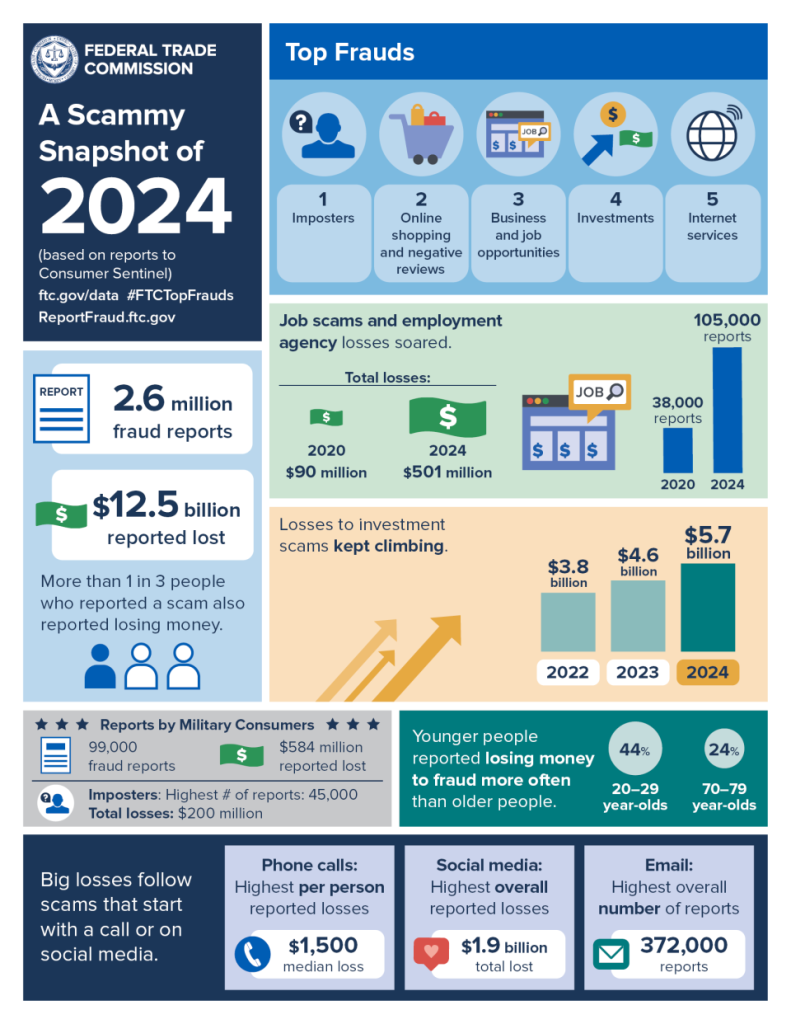


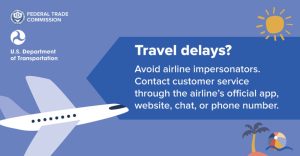
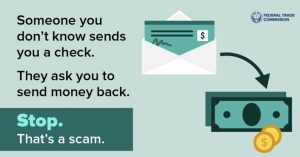
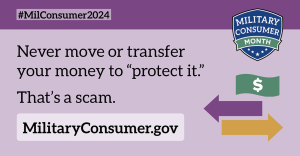

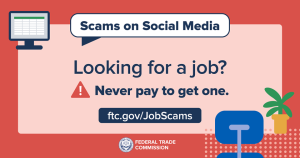
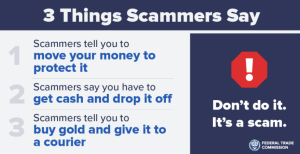
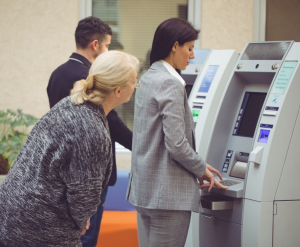
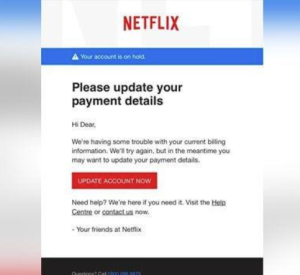 Here are examples of how scammers trick you; they:
Here are examples of how scammers trick you; they:
